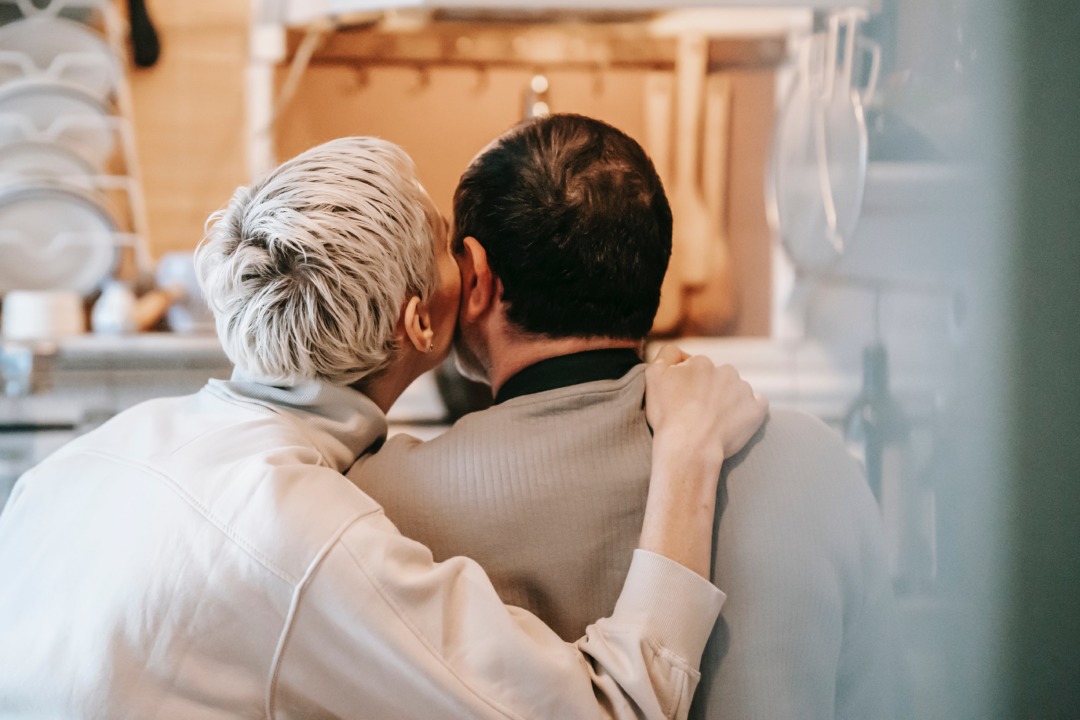I had been binge drinking for most of my life before I quit alcohol for good. By the time I was 32 I found myself stuck in a cycle of drinking too much on weekends, and then suffering from hangovers that lasted several days. Married with an 18 month old son, I was struggling to keep up. Once I realized that I didn’t need alcohol like I had thought, my life was forever changed. My husband and I had been together for seven years when I quit drinking. We both had to figure out what our lives, and relationship, looked like without alcohol.
Even in the case of positive change, the people in your life may need time to adapt to the new you. Hopefully your loved ones will be there to support you through your sobriety, even if they aren’t sure what that looks like at first. Here are five ways that my husband supported me that may help you on your own journey, or while supporting someone else on theirs.
1. Accepted me without judgment
When I decided to quit drinking, I didn’t tell anyone at first. I was afraid that people wouldn’t believe me and to be honest, I didn’t believe in myself quite yet. After a week without alcohol, I told my husband what I was up to. In the past after particularly rough nights, I’d joke that I was “never drinking again.” There were many rough nights, so I couldn’t expect him to think anything would be different this time. Despite this, he accepted my decision without judgement or apprehension. His support then helped me believe in myself.
Once my confidence grew, that’s when the real work started. I had to figure out who I was without alcohol, and some days were better than others. My husband was learning about the person I was becoming, and he started to fully trust me when I said I wasn’t drinking anymore.
2. Showed interest in what I was doing
If you’ve never had an unhealthy relationship with alcohol, it can be challenging to truly empathize with what a sober person is navigating.
My husband falls in that category, so he didn’t pretend to know what I was going through. He was there for me, without judgement or assumptions, and that’s what I needed. I was having major realizations about myself and my relationship with alcohol. Although he couldn’t relate, he showed interest in my journey. He gave me advice if I asked for it. He asked questions, and some days he just listened. Currently, I am very active in the online sober community. I write about being alcohol-free and I give support to others. I ask him to read my writing and I talk about projects I’m working on. He still doesn’t entirely “get it,” but he knows that this is a passion of mine, so he continues to actively learn and support me.
3. Helped me create a safe environment
As soon as I decided to quit drinking, I removed all of the physical things that could trigger me from my home. I got rid of the alcohol, the fancy glasses, and the bottle openers. My husband doesn’t drink, so it didn’t bother him. If you live with a person who still drinks, ask them if you can put those things away for a short time. The beginning of your sobriety journey can be the most challenging and the most pivotal. The more alcohol-free days you string together, the easier it gets.
For some people, it’s helpful to have something to replace their alcoholic beverages. If this is you, keep those fancy glasses around. You can create a new celebratory ritual. Find some non-alcoholic drink recipes and have fun with them (start with Monument’s Delish AF drinkbook!) Being sober doesn’t have to be boring!
4. Gave me time and space
My husband supported me by letting me take my time. He let me do things on my terms, however long that was going to take. At first, I immersed myself in everything alcohol-free. That often meant spending more time on my phone. It meant listening to a podcast or reading a book instead of hanging out with him. This didn’t last forever. As time went on, I didn’t need to focus on not drinking nearly as much. It became second nature. While I still may spend a little too much time on my phone, I can now balance my energy on other activities I enjoy, and time with my family.
5. Let me lead
Removing alcohol from my life was a personal choice and I wasn’t forced into making the decision. My husband was supportive and helpful, but he didn’t try to run the show. He asked me how I was and if I needed anything. If I wanted to leave an event early or not go at all, he understood. He let me call the shots when it came to our social life. As I got more comfortable being a non-drinker, I felt like I needed his support less. It was as if I was standing on my own two feet and I was confident in my own choice. He’d say I still call the shots. He’s mostly right.
If you’re beginning this journey and not sure how to engage your partner, here’s more information from a therapist about how to ask your partner for support in your recovery. If your partner is already aware of your choice to get more out of life by drinking less, you can also attend a Monument support group together. In Making progress together: For family, friends, and those in recovery they discuss how to better understand one another and support each other throughout this journey.
But wait! What if my partner isn’t supportive of my decision?
When sharing my story, this is a common follow-up question. It’s possible your partner isn’t ready to support you, or doesn’t know how to yet. If they have an unhealthy relationship with alcohol themselves, perhaps your decision has caused them to confront their own habits in a way that’s uncomfortable for them. To ease into the journey together, see if they’ll cut back or stop drinking for a short time with you as a challenge. Or, have a conversation about if moderation might be a better place to start. If they aren’t receptive, you can start by demonstrating all of the benefits from not drinking through your actions, and encourage them to join you at their own pace.
It’s a balance of communicating your needs while making room for them to share and work through their own discomforts too. With time, your partner should begin to understand why this decision is important to you, and how they can be there for you.
It’s also helpful to find outside support, such as specialized alcohol therapy or therapist-moderated support groups (check out Monument’s support group dedicated to navigating relationship challenges and sobriety or moderation).
These resources can help support you in both reaching your goals of sobriety or moderation, and navigating any relationship challenges that may arise in the process (like changes in love languages).

How Do I Support My Partner When They Quit Drinking?
If you’re reading this to learn about how to support a partner, that’s an incredible step and hopefully the ways my partner supported me have served as a helpful example. Remember that everyone’s version of support is unique. The best way to support your partner in anything is to do so in a way that works best for them. If you’re unsure of what that looks like, ask! Meet them where they’re at and try to fill the gaps so that their sobriety can be successful.
A great way to support your sober partner is to show interest in their recovery journey. You are life partners – so in a way, it’s your journey too. Ask them how they’re doing, and listen. Before you give your opinion, ask if they want your input or if they want to vent. Make them feel comfortable to share about what’s going well, and what isn’t. Be open to change, in your partner and your relationship. They’re learning how to be sober in a world filled with alcohol, it’s not always going to be easy. Your relationship will evolve too. Embrace the changes and get excited to get to know the new version of your partner.
You might not know how they’re feeling, but you can help by educating yourself about what they’re going through. Read books and blogs about how to support a loved one in recovery, listen to podcasts, and check out sober social media accounts.
Do I Need to Stop Drinking to Support My Partner’s Recovery?
It’s not required, but it helps. And it doesn’t have to be forever. Even a short break from alcohol will help your partner feel less alone in their journey. It shows that you are willing to do whatever it takes for them to better themselves. You might realize that life without alcohol or with less alcohol can benefit your own health and happiness as well.
Getting alcohol out of the house is another way to support your partner in their sobriety. Removing the temptation takes a huge weight off them. It allows them to focus on other parts of their sobriety.
How Can Sobriety Benefit Relationships?
Alcohol numbs us and it can put a hazy cover over our relationships too. Sobriety allows us to connect in a way that we didn’t know was possible. This deeper connection enhances relationships in a variety of ways.
Your conversations are better, you can work through issues without alcohol getting involved, and there is more space for enjoying each other’s company.
Another bonus of quitting drinking is having more time and money. You and your partner can finalize those travel plans, or go to that fancy restaurant you’ve been meaning to check out but haven’t been able to yet.
There are both big and small ways that sobriety benefits our relationships. It can remind us of why we chose our partners in the first place. Often we’re so busy that we lose sight of what matters. Sobriety helps us figure out what truly makes us happy. Quitting drinking is no quick fix for a relationship, but by removing alcohol, you can clear a path towards moving forward and growing as a couple.
My relationship with my husband is much different now than it was when I was drinking. Not only have I grown as a person, but we’ve grown closer as a couple too. Honesty and communication are at the forefront of our relationship. We’re partners and we confront issues head on. We no longer argue about trivial things. Being together and happy is important to us and we try to not take life too seriously. Since I’m no longer numbing myself with alcohol, he gets the real me all the time, good and bad. And I wouldn’t want it any other way.

